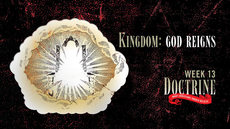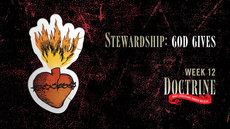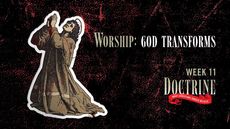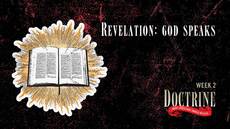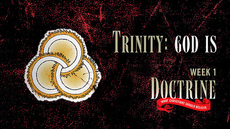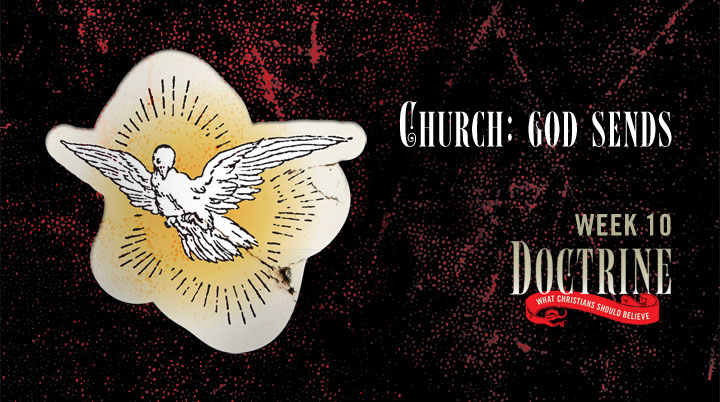
This sermon blog is intended to supplement the sermon Church: God Sends as part of the ongoing series Doctrine: What Christians should believe.
The big idea in the sermon is that Jesus is God come into human culture as a missionary. And, that Jesus earthly missional ministry was empowered by God the Holy Spirit. This is perhaps most clearly seen in the gospel of Luke where Jesus is conceived by the Holy Spirit, prophesied over by Simeon who was "in the Spirit" at his Temple dedication, later anointed by the Holy Spirit who descended upon him in the form of a dove at his baptism, promised to baptize people in the Holy Spirit by John the Baptizer, and is elsewhere said to be "fully of the Holy Spirit" and "lead by the Spirit." Furthermore, Jesus began his public ministry by reading from Isaiah 61:1-2 which says, "The Spirit of the Lord is upon me…"
In the chapter I contributed to the book The Supremacy of Christ in the Postmodern World I spoke of Jesus Spirit lead earthly mission saying:
Jesus… came into a culture and participated in it fully by using a language, participating in various holidays, eating certain foods, enjoying various drinks, attending parties, befriending people, while never crossing a line into sin. Jesus’ life is the perfect and model missionary life lived for God in culture that we are to emulate, without falling into the pitfall of liberal syncretism or fundamental sectarianism. It deserves to be noted, however, that for those who were fundamental and separatistic in their thinking, Jesus simply went too far. In their eyes, though not the eyes of God the Father, his actions were sinful and they falsely accused him of being a glutton, a binge drinker, and a good tipper at Hooters. (Matthew 11:19) In his magnificent High Priestly prayer Jesus in fact prayed against us becoming either liberals who sin by going too far into culture and act worldly, or fundamentalists who do not go far enough into culture and act pharisaically: "I do not ask that you take them out of the world, but that you keep them from the evil one. They are not of the world, just as I am not of the world. Sanctify them in the truth; your word is truth. As you sent me into the world, so I have sent them into the world." (John 17:15–18)
Jesus prayed that we would not leave the sick and dying world and huddle into a safe subcultural ghetto of Christian nicety, but that we would stay in the world. In the same way, Jesus himself did not remain in the comforts of heaven but rather entered into a sinful culture on the earth as a missionary. Jesus also prayed that we would not simply go with the flow of sin and death in the culture but rather swim upstream against the current of worldliness by living countercultural lives like him, guided by the timeless truths of Scripture intended to be lived out by missionaries in every culture.
Furthermore, in John’s gospel alone, Jesus told us no less than thirty-nine times that he was a missionary from heaven who came to minister incarnationally in an earthly culture. (John 3:34; 4:34; 5:23, 24, 30, 36, 37, 38; 6:29, 38, 39, 44, 57; 7:16, 28, 29, 33; 8:16, 18, 26, 29, 42; 9:4; 10:36; 11:42; 12:44, 45, 49; 13:20; 14:24; 15:21; 16:5; 17:3, 8, 18, 21, 23, 25; 20:21) Furthermore, Jesus also commands us to be missionaries in culture as he was: "As you sent me into the world, so I have sent them into the world." (John 17:18) He also said, "As the Father has sent me, even so I am sending you." (John 20:21)
To do that we must follow the example of Jesus by being Spirit filled and Spirit lead which sets the stage for the advent of the New Covenant Church. And, Luke follows his gospel which is the record of the Spirit empowered ministry of Jesus Christ with the record of the Spirit empowered ministry of Jesus people the church who worship Jesus as God and continue his mission. Following his resurrection and just prior to his ascension in Acts 1:4-9 we read of Jesus, "And while staying with them he ordered them not to depart from Jerusalem, but to wait for the promise of the Father, which, he said, "you heard from me; for John baptized with water, but you will be baptized with the Holy Spirit not many days from now." So when they had come together, they asked him, "Lord, will you at this time restore the kingdom to Israel?" He said to them, "It is not for you to know times or seasons that the Father has fixed by his own authority. But you will receive power when the Holy Spirit has come upon you, and you will be my witnesses in Jerusalem and in all Judea and Samaria, and to the end of the earth."
Acts 2 then records God the Holy Spirit descending upon the early Christians to anoint and empower them for missional ministry in the same way that he descended upon Jesus following his baptism. In that chapter we read of the sermon preached by Peter, the conversion of 3,000 people evidence of the presence of the Holy Spirit, and ensuing activities of the church saying in Acts 2:42-47, "And they devoted themselves to the apostles’ teaching and the fellowship, to the breaking of bread and the prayers. And awe came upon every soul, and many wonders and signs were being done through the apostles. And all who believed were together and had all things in common. And they were selling their possessions and belongings and distributing the proceeds to all, as any had need. And day by day, attending the temple together and breaking bread in their homes, they received their food with glad and generous hearts, praising God and having favor with all the people. And the Lord added to their number day by day those who were being saved."
In our forthcoming book Vintage Church due out in January, Dr. Gerry Breshears and I use Acts to define the church saying:
The local church is a community of regenerated believers who confess Jesus Christ as Lord. In obedience to Scripture they organize under qualified leadership, gather regularly for preaching and worship, observe the biblical sacraments of baptism and communion, are unified by the Spirit, are disciplined for holiness, and scatter to fulfill the great commandment and the great commission as missionaries to the world for God’s glory and their joy.
In the book we then go on to examine the nine marks of the true local church (which are also the main points of my sermon this week) as:
- Regenerated church membership
- Qualified leadership
- Gather for preaching and worship
- Sacraments rightly administered
- Unified by the Spirit
- Disciplined for holiness
- Obey the great commandment to love
- Obey the great commission to evangelize and make disciples
Lastly, in regards to what qualifies as a church Dr. Wayne Grudem helpfully summarizes the uses of "church" saying: A "house church" is called a "church" in Romans 16:5 ("greet also the church in their house"), 1 Corinthians 16:19 ("Aquila and Prisca, together with the church in their house, send you hearty greetings in the Lord"). The church in an entire city is also called "a church" (1 Cor. 1:2; 2 Cor. 1:1; and 1 Thess. 1:1). The church in a region is referred to as a "church" in Acts 9:31: "So the church throughout all Judea and Galilee and Samaria had peace and was built up." Finally, the church throughout the entire world can be referred to as "the church." Paul says, "Christ loved the church and gave himself up for her" (Eph. 5:25) and says, "God has appointed in the church first apostles, second prophets, third teachers . . ." (1 Cor. 12:28). . . . We may conclude that the group of God’s people considered at any level from local to universal may rightly be called "a church." (Wayne Grudem, Systematic Theology: An Introduction to Biblical Doctrine (Grand Rapids, MI: Zondervan, 1994), 857.)
For those wanting to study this issue more fully I do have a book titled Church Leadership due out in a few weeks and if you pre-order it from their web site, Crossway will send you a free copy in PDF format immediately and a hardcopy when the book is published. The book is intended to be read in roughly one hour and covers the following subjects:
- Chapter 1 – Pastor Jesus
- Chapter 2 – Elders
- Chapter 3 – Women in Ministry
- Chapter 4 – Deacons
- Chapter 5 – Members
- Chapter 6 – Leadership Teams
- Appendix I – Answers to Common Questions about Church Leadership
- Appendix II – Further Reading on Church Leadership
- Appendix III – Sample Church Membership Covenant
Also, last Friday Dr. Gerry Breshears and I sent in the manuscript for our forthcoming book Vintage Church: Timeless Truths and Timely Methods to Crossway. It is very packed lengthy book (roughly 400 pages at present with edits forthcoming) covering the following topics to be published in January 2009:
- Chapter 1 – What Is the Christian Life?
- Chapter 2 – What Is a Christian Church?
- Chapter 3 – Who Is Supposed to Lead a Church?
- Chapter 4 – Why Is Preaching Important?
- Chapter 5 – What Are Baptism and Communion?
- Chapter 6 – How Can a Church Be Unified?
- Chapter 7 – What Is Church Discipline?
- Chapter 8 – How Is Love Expressed in a Church?
- Chapter 9 – What Is a Missional Church?
- Chapter 10 – What Is a Multi-Campus Church?
- Chapter 11 – How Can a Church Utilize Technology?
- Chapter 12 – How Could the Church Help Transform the World?

